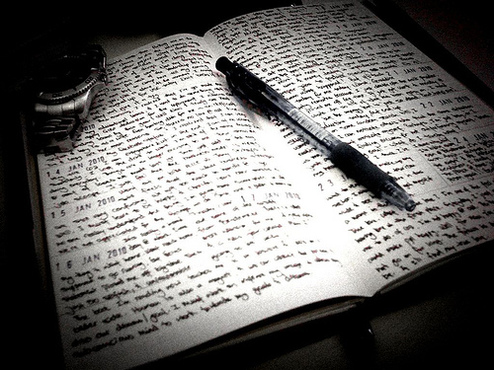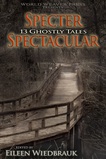 Image credit: "Time to Write" by koalazymonkey via Flickr. Image credit: "Time to Write" by koalazymonkey via Flickr. By Shannon Robinson. Mid-October. The nights are getting longer, and the temperature is dropping. Maybe it’s my Canadian blood, but I thrive in the chill. And the extra hours of darkness encourage me to hunker down and write. As Halloween approaches, I think there’s no better time to start a ghost story. Even if you’ve never written a spooky story—or any kind of story, why not give it a try? You may surprise yourself. Frankenstein was eighteen-year-old Mary Shelley’s first work of fiction. She started writing it for a competition between her, Percy Bysshe, John Polidori, and Lord Byron to see who could write the best horror tale. (... I think she won.) But here’s a scary thing: the blank page. Below is a list of open-ended writing prompts if you need help getting started: 1. Make a list of animals, one for each letter of the alphabet. Write a story about a ghostly incarnation of one of these animals. Who sees this animal? Under what circumstances does the animal appear? Is it friendly, unfriendly, familiar-looking, distorted? 2. Start with a setting—be as specific as possible when imagining your surroundings. The space may be one that is abandoned, or in use. Now invite a ghost into that space, and picture how it interacts with the setting. For example, imagine a hospital (a maternity ward, an ER waiting room, a physiotherapy facility). A laundromat. An automat. A Weight Watchers meeting. A convention of some sort (comic books, taxidermy, Tea Party). A roller rink. A brothel. A commune. A storage locker. A construction site (for a dream house, a school, a prison). A waterpark. The Chernobyl Exclusion Zone. 3. What was your last nightmare? Or your most vivid nightmare? In the world of your story, it comes true. 4. Have a look at your family photo albums. Do people have these anymore? Look through your digital photos. Select a picture with several people in it. Imagine that one of the people in the photograph appears only as a ghostly image. Or that one of the people in the picture is only visible to you. Write about this ghostly person. 5. What was your worst Halloween costume? “Worst” as in ill-advised, badly made, grudgingly worn, unpopular, what have you. Imagine being stuck in that costume forever. (For a hilarious look at a dubious Halloween costume choice, read Ryan Boudinot’s “The Littlest Hitler.” It’s not a horror story, but it did make me cringe!) 6. This prompt works on the fortune-cookie principle. Go to a writing prompts website. You can go here: www.creativewritingprompts.com, or just Google “writing prompts.” Now try adding, “in a haunted house” after each one. (“Write about a weird day in your workplace” ... in a haunted house. “Write about what you’d say to an uninvited guest” ... in a haunted house. “Write about a person who does everything ‘by the book’” ... in a haunted house. “Use the first line of a nursery rhyme to start a story” ... [set] in a haunted house. Etc.) 7. Use true crime as a departure point. Imagine that a notorious killer (from the headlines of today or yesteryear) was not caught, or managed to escape, or was freed on a technicality. Imagine how his or her deceased victims now seek vengeance/justice. 8. Have a look at this list of phobias: www.phobialist.com. Pick a fear that speaks to you—either one that you identify with, or one you find baffling—and make it the centerpiece of your story. (Think of how Hitchock’s The Birds plays on ornithophobia.) Feel free to invent your own phobia. Feel free to make a list of your own fears. I recently came across an online poster who said “I’ve always had an irrational fear of porcelain dolls and whales. A horror story incorporating one of those themes would probably shake me to the core.” As a challenge, try to incorporate both. 9. This prompt calls for an Exquisite Corpse (appropriately enough!) An Exquisite Corpse is a composite literary creation: either in a room together or over email, write a ghost story with a group of friends, with each person taking a turn on one sentence at a time. You can use one of the sentences in the prompt below to start, if you like. Use the completed Exquisite Corpse as a rough outline for your story. 10. Write a story that begins with one of the following sentences. Feel free to change pronouns and verb tenses: I didn’t mean to kill her. She’d forgotten about the baby. This was not the cure they’d been hoping for. Sometimes we must do terrible things in the name of love. He carried it with him everywhere. The door had been nailed shut for a reason. I met him at the crossroads. 11. Observe the sounds that you can hear, right now. What if there were no explanations for them? For example, right now I can hear the traffic rushing by on the road outside my house. I can hear my toddler cooing in his sleep. I can hear my neighbor walking around upstairs. But what if I were in a cottage in the middle of the woods? What if I were childless? What if no one lived upstairs? Write about your own “mysterious” sounds. 12. List twenty objects. Do not confine yourself to items from this century (although please, somebody, write about a GPS!). Pick an object, and imagine that it is somehow haunted or cursed. What is the history of this object? How has it come to be in the current owner’s hands? Perhaps the object is the focus of a particular ghost’s attention. What happens to the object? How does it affect those around it? (For a wonderful creepy-object story, read John Cheever’s “The Enormous Radio.”) 13. The experience of physical pain is a kind of phantom. Try to describe a particular kind of physical pain (a burn, a broken limb, childbirth, a deep cut). Use this as the first paragraph of your story about a person who has died, or about someone who mourns the dead. 14. Think of someone you believe is a jerk. Now attribute their bad behavior to demon possession. 15. This prompt involves mix and match. Select from this list of ghosts: Poltergeist (a disruptive ghost, capable of moving objects) Dybbuk (in Jewish tradition, a malevolent possessing spirit, a dislocated soul) Doppelganger (a supernatural double of a living person) Banshee (a female specter, an omen of death) Gjenganger (in Scandinavian tradition, the ghost of a murderer or murder victim; appears in corporeal form) Succubus/Incubus (female and male respectively, a supernatural being who takes human form to perform seduction) Jikininki (in Japanese tradition, demon corpse-eaters, cursed spirits of selfish or greedy people) You can also create your own kind of ghost, for example, a Celator, a ghost who hides things—especially when you’re looking for them. Now, place your specter within one of these genres: Romance Melodrama Speculative fiction/Sci Fi Western Magic Realism Mystery Memoir Fairy Tale Fable Satire Tall Tale Journalism You can go meta with it: for example, you could have a ghost who interrupts the filming of a romantic comedy. Or a dybbuk who appears to be revising an author’s memoir. Try adding a supernatural element to unexpected form, such as a musical, a cookbook, a crossword puzzle, an instruction booklet, or a suicide note. 16. Imagine an individual who casts a spell. Choose one (or a combination) of the seven deadly sins as motivation for this spell: pride, envy, gluttony, lust, anger, greed, sloth. The spell-caster will not identify his or her motivations as negative. The spell both is and is not a success. 17. Imagine a curse. This curse may apply to an individual, a family, or an entire community. To help you come up with ideas for a curse, think of your own life. What plagues you? What haunts you? In his book on writer’s craft, On Writing, Stephen King says he turned his experiences with drug addiction into metaphors on the page. 18. Write a personal ad from the devil (or a devil, or a ghost). And then imagine someone answers it. How does that date go? What does the subsequent relationship look like? Experiment with point of view and tone. For example, try telling the story from the point of view of the ad-answerer’s mother, in a serious tone. So there you have it. I hope you have fun with these prompts. Remember, Halloween is a time to put on costumes and embrace the weird: carry this into your stories. Although I’ve written ghost stories before, Specter Spectacular is my first inclusion in a ghost story anthology. My husband insists on calling the book Spooktacular. He’s teasing me; he doesn’t believe in ghosts—but he does believe in good stories. I’m very proud to be part of such a terrific collection.
 Shannon Robinson’s work has appeared or is forthcoming in Nimrod, Sycamore Review, Crab Creek Review, Sou’wester, New Ohio Review, Prick of the Spindle, and New Stories for the Midwest. Recent honors include the Katherine Anne Porter Prize, an Elizabeth George Foundation grant, and a Hedgebrook Fellowship. She holds an MFA from Washington University in St. Louis, and this past fall was the Writer-in-Residence at Interlochen Center for the Arts. Read her short story, "Wendigo," in Specter Spectacular.
6 Comments
Stephen hess
7/27/2015 11:47:28 am
Want to start trying to get some short stories published
Reply
Anna Bogen
5/28/2016 06:40:37 pm
This list helped me SO much, and normally these prompt lists really don't. You have some really intriguing ideas here! Thanks so much!
Reply
Rose
9/21/2018 02:59:00 pm
Very helpful thank you!
Reply
Terry Jones
10/22/2020 10:06:37 am
Thank you. I am visited by spirits of past relatives, and hove been able to write their stories. Now I am becoming more intrigued with voices. Thank you for the prompts.
Reply
Your comment will be posted after it is approved.
Leave a Reply. |
World Weaver PressPublishing fantasy, paranormal, and science fiction. Archives
February 2024
|
- Home
-
Books
-
All Books
>
- Beyond the Glass Slipper
- Bite Somebody
- Bite Somebody Else
- Black Pearl Dreaming
- Cassandra Complex
- Causality Loop
- Clockwork, Curses, and Coal
- Continuum
- Corvidae
- Cursed: Wickedly Fun Stories
- Dream Eater
- Equus
- Fae
- Falling of the Moon
- Far Orbit
- Far Orbit Apogee
- Fractured Days
- Frozen Fairy Tales
- Glass and Gardens: Solarpunk Summers
- Glass and Gardens: Solarpunk Winters
- Grandmother Paradox
- Grimm, Grit, and Gasoline
- Haunted Housewives
- Heir to the Lamp
- He Sees You When He's Creepin': Tales of Krampus
- Into the Moonless Night
- Jack Jetstark's Intergalactic Freakshow
- King of Ash and Bones (ebook)
- Krampusnacht
- Last Dream of Her Mortal Soul
- Meddlers of Moonshine
- Mothers of Enchantment
- Mrs Claus
- Multispecies Cities
- Murder in the Generative Kitchen
- Recognize Fascism
- Scarecrow
- Sirens
- Shards of History
- Shattered Fates
- Skull and Pestle
- Solarpunk (Translation)
- Solarpunk Creatures
- Solomon's Bell
- SonofaWitch!
- Speculative Story Bites
- Trenchcoats, Towers, and Trolls
- Weredog Whisperer
- Wolves and Witches
- Anthologies and Collections
- Novels
- Novellas
- Fairy Tale
- Fantasy
- Romance
- Science Fiction
- Urban/Contemporary Fantasy
- Young Adult SFF
-
All Books
>
- Blog
- About
- Contact
- Press / Publicity
- Newsletter Signup
- Privacy Policy
- Store

 RSS Feed
RSS Feed